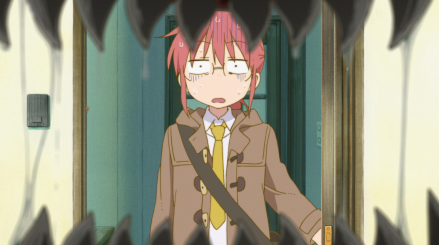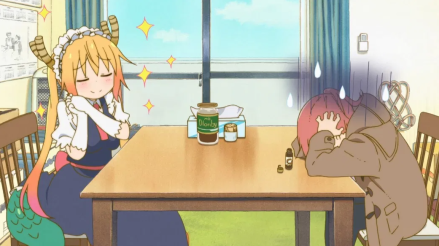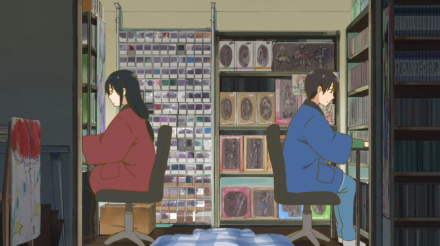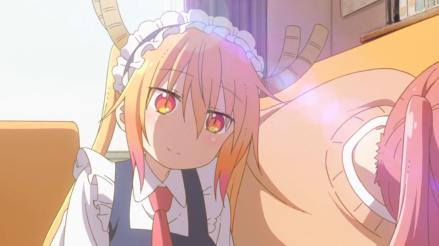Chances are that if you were linked here from another blogger pal, then you might be new. To those first-timers, “Hi, I’m Takuto, welcome to my anime cafe!” For the OWLS blog tour’s sixth monthly topic of 2020, “Mindfulness,” I wanted to take a breather and share some of my loose thoughts on a title that I’m quite late to the game to, but am enjoying nonetheless: the much-beloved Miss Kobayashi’s Dragon Maid.
If we don’t take care of our minds and souls, we will always be in pain.
For the past few months, things have been pretty hectic. Everyone’s lives have changed to some degree, and we can’t help but feel anxious, nervous, and overwhelmed. This month we will be focusing on ourselves and keeping a strong peace of mind with our theme, “Mindfulness.” We will be analyzing characters that have crafted and practiced their own philosophy on life and have spread their beliefs to others. We will also be talking about habits, hobbies, and things that are keeping us sane, positive, and peace within our souls.
I find that mindfulness can apply to many other wonderful shows out there, so it was tough picking just one. Thanks Lyn for the prompt!

A brief discussion of the 13-episode Winter 2017 anime series “Miss Kobayashi’s Dragon Maid,” animated by Kyoto Animation, directed by Yasuhiro Takemoto, and based on the manga of the same name by Coolkyousinnjya.
Bound by Love and Servitude
It’s another hangover kind of morning for stoic programmer Kobayashi, only on this particular day, she is greeted at the front door of her apartment by a giant green dragon with shiny scales and sharp, saliva-drenched teeth. The dragon suddenly changes to the form of a young busty woman in a maid outfit, and aside from her horns and the green tail behind her, she appears relatively normal. The energetic maid’s name is Tooru, and she’s come to work for Kobayashi for free.
A trip down memory lane has Kobayashi recalling that—in a drunken stupor the previous night—she had invited Tooru to stay at her place. Kobayashi was the first to show Tooru kindness since entering the human world, and Tooru plans to serve her savior with a genuine love to return that compassion. Although plenty hesitant, Kobayashi decides to welcome the energetic maidservant out of both guilt and a curiosity for Tooru’s superior dragon powers.
Tooru’s unconventional powers prove astonishingly useful in Kobayashi’s average Japanese life. What Kobayashi wasn’t expecting was, however, was for Tooru’s dragon powers to attract other mythical beings from the world of magic. A cute dragon, a fun dragon, a stern dragon, and surely more to come, Kobayashi’s little apartment slowly starts to feel more crammed—and yet, a little more like home, too.

Coping at Kobayashi’s Place
A bunch of magical creatures may have crashed her apartment, but Kobayashi doesn’t stop that from throwing off her day. She tries to end her long days in the office with a round of drinks, which usually entails her otaku co-worker Takiya joining her. Together they engage in playful arguments that serve to vent stress. Afterwards, she crashes, and leaves the repercussions of her binge drinking for tomorrow’s problems. Unlike most, drinking doesn’t leave Kobayashi overly grumpy and hangry, which is good for her new roommates and friends!
Speaking of, Tooru manages pretty well as a dragon maid. There’s always plenty to clean, and with guests coming and going from the apartment, Tooru’s diligent maid service comes in handy. Often, she is able to express her love for Kobayashi by finding unorthodox solutions to common problems. Whether rinsing the laundry with her stain-removing saliva or clearing rainy skies with a terrifying burst of fire power, Tooru only serves to please Kobayashi in any way she can. Tooru also looks past the gender norms of same-sex couples and loves her master with all her heart, to which Kobayashi returns with warm affection. (Happy Pride Month, y’all!)
Kanna is the third to join Kobayashi’s growing family, and arguably undergoes the most change as a result of being such a young dragon. She enjoys people-watching, fighting to the death with Tooru playing, and sleeping. Kanna also takes an interest in making new friends, to which Kobayashi and Tooru help her enroll in elementary school. Attending class with the other kids makes Kanna feel like she has a place to belong outside Tooru’s wingspan. The poor kid was (temporarily) kicked out of the magical world for pulling a harmless prank, after all, so any chance she can play again with others she takes. Coloring, crafting, and running around with her classmates is a way for Kanna to momentarily forget the pain of her banishment.
Lastly, there’s Tooru’s mentor friends from back home, Lucoa and Fafnir. The dragon goddess from legend itself who got drunk and caused a scandal, Quetzalcoatl “Lucoa” takes a liking to a young chuuni boy after he “summons her” from the other realm. Lucoa plays along, enjoying both his company and the fact that she’s only a short flight away from the girls Kobayashi’s apartment. Fafnir winds up rooming with Takiya after they bond over video games, and although he’s still cautious around humans, Takiya seems alright enough. Through the gaming community, Fafnir learns to relax a bit and accept that not all humans should be burnt to cinders (which trust me—it’s a big step for him)!

A House Becomes a Home
As a slice-of-life comedy with a splash of fantasy, Miss Kobayashi’s Dragon Maid is just as fun as it sounds. The characters get themselves wrapped up in all kinds of daily matters as they try to adjust to their new home on Earth, and the results are as heartwarming as they are hilarious. It’s great, and I get why everyone loves this series.
While I’ve only seen the first seven episodes, I can tell that this is one of those “healing” shows people would turn to during stressful times. To keep their own sanity in this new way of life, our characters gradually start to develop unique coping mechanisms fit just for themselves. For our dragon friends, this involves bonding with humans and learning about their world. As for Kobayashi, it’s about realizing for the first time that life is a lot more enjoyable when you can spend it with others. Certainly, building a family is far more complex than programming for Kobayashi, but it sure is an invaluable, incomparable gain.

The more I treasure what I have right now, the sadder I’ll be when I lose it. But, as sad as I may feel, I’m sure I won’t regret it. — Tooru
Afterword
Guys, I absolutely cannot wait to finish watching this series! I totally get why you all have been recommending it to one another like crazy ever since it aired three years ago. I’m enjoying Tooru’s antics so much, and Kobayashi is such an unenthusiastic queen, I love it. Who’s your favorite character from Miss Kobayashi’s Dragon Maid? Let me know in the comments. I may end up doing a full series review later down the line, but just in case, I’ll go ahead and pass it with the recommendation to watch this one—especially if you’re seeking a more chill watch to ease these stressful days we’ve recently had.
This concludes my June 13th entry in the OWLS “Mindfulness” blog tour. My good friend Hikari (Hikari Otaku Station) went right before me with a post covering some of the shows she’s been watching that have helped with her mental health, which you can read right here! Now, look out for Aria (The AniManga Spellbook) with a post coming Tuesday, June 16th! Thank you so much for reading, and until next time!
– Takuto











